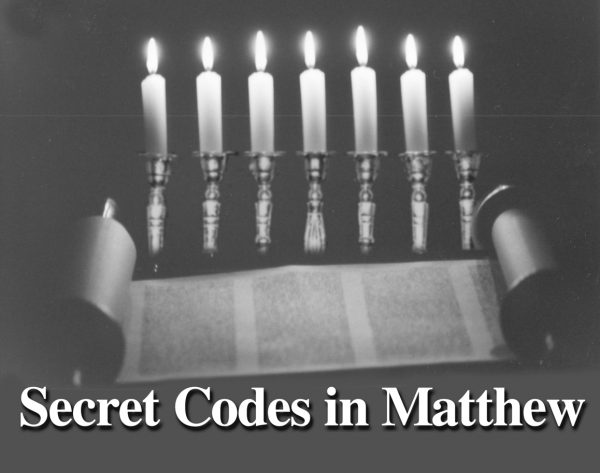The Secret Codes in Matthew: Examining Israel’s Messiah, Part 1, by Kevin M. Williams

Forward: As a preparatory note, at times I will mention an “Israeli believer.” The distinction is, these are Jewish believers in Messiah Jesus who are also citizens of national Israel. The political situation in the Holy Land is one that, being recognized as a believer in Jesus can mean losing your job, your home, suffering very real persecution, potentially losing your citizenship, and being exiled from your own promised inheritance. So, while I would like to give credit where credit is due, some of the teachers quoted in this text may have to remain anonymous so their identities are protected. I am however, eternally grateful to have been able to learn from these men of God and to be able to pass this information on to Christian brethren everywhere.
—Kevin Williams
While this is a study on the book of Matthew, it seems prudent to begin in a different gospel account. Jesus said a great deal about himself during his life here on earth. For instance, in Luke 24:44 we read, “Now He said to them, ‘These are My words which I spoke to you while I was still with you, that all things which are written about Me in the Law of Moses and the Prophets and the Psalms must be fulfilled.’” We find a similar statement in Luke 24:27, “And beginning at Moses and all the Prophets, He [Jesus] expounded to them in all the Scriptures the things concerning Himself.”
By the master’s inference, we should be able to go into every page of the Hebrew Scriptures and find evidence of Jesus the Messiah. It is possible, and a worthy effort.
The same is true in the gospels. An obvious statement? Certainly. But the intrinsic Jewishness of Jesus, his message to his people, Israel, and the clues to the nation of Abraham, Isaac, and Jacob are locked in the gospel of Matthew is such a way that it is easily overlooked in a predominately non-Jewish Christian culture.
And so, we being our study of the Gospel According to Saint Matthew not quoting Matthew, but quoting from the Gospel According to Saint John. Remarkably enough it was during one of the national festivals not commanded in the Bible that Jesus affirms that he has already told us he is the Messiah.
At that time the Feast of the Dedication (Hanukkah) took place at Jerusalem; it was winter, and Jesus was walking in the temple in the portico of Solomon. The Jews therefore gathered around Him, and were saying to Him, “How long will You keep us in suspense? If You are the Christ, tell us plainly.” Jesus answered them, “I told you, and you do not believe;” (John 10:22-25).
Yet, as we read through the pages of Matthew, Jesus never comes out and plainly states, “I am the promised Messiah.”
In this study, we shall examine the Messiahship of Jesus, along with many other aspects of this Redeemer and Savior. As we journey down this path, we may find new and wondrous discoveries about Jesus we had not considered before. We may also find out some things, which challenge our traditions and historical way of thinking. If you have any die-hard traditions and interpretations, be forewarned—you may end up placing these sacred cows on the altar! May you do so with a willing heart.
___
In 1997, At the Church of the Good Shepherd in Wayne, Ohio, an Israeli believer asked the congregation, “Who can tell me the first verse of the Old Testament?” Naturally, everyone chimed in; “In the beginning God made the heavens and the earth.”
Category: Biblical Studies, Pneuma Review, Spring 2001


